Industry Growth
Overall employment of speech-language pathologists is projected to grow 29% by 2030, much faster than the average for all occupations.
Freedom Hall is expected to reopen Monday, Feb. 16. Students with questions about the status of a class should contact their professor.
As a speech-language pathology student at Widener, you'll prepare for a rewarding career through faculty mentorship and high-quality clinical experience.
Master's
On Campus
67
6 semesters
As a speech-language pathology student, you'll take the inside track to a rewarding career. Through an in-depth, sequential curriculum, you'll experience dynamic teaching and hands-on, clinical learning. Throughout the program, you'll have the opportunity to apply your knowledge and skills in a variety of settings, from local service projects to pro bono work in our Speech-Language Pathology Clinic and Chester Community Clinic.

The Master of Science (M.S.) education program in speech-language pathology (residential) at Widener University is accredited by the Council on Academic Accreditation in Audiology and Speech-Language Pathology of the American Speech-Language-Hearing Association, 2200 Research Boulevard, #310, Rockville, MD 20850, 800-498-2071 or 301-296-5700.
View the course catalog for information on coursework and curriculum requirements.
The mission of the speech-language pathology program at Widener University is to prepare clinically competent, ethical, community-focused, and culturally respectful speech-language pathologists, committed to preventing, diagnosing, and treating communication and swallowing disorders across the lifespan.
To that end, the program has five goals and curricular themes:
The speech-language pathology program supports and upholds Widener University’s commitment to diversity and non-discrimination as described in the Equal Opportunity, Harassment, and Nondiscrimination Policy (EOHN).
The Council on Academic Accreditation in Audiology and Speech-Language Pathology (CAA) accredits eligible master's degree programs in speech-language pathology and audiology. The CAA serves the public by promoting excellence in the graduate education of audiologists and speech-language pathologists.
Learn more about CAA policies and procedures
Please note that a complaint about any accredited program or program in candidacy status may be submitted by any student, instructional staff member, speech-language pathologist, audiologist, and/or member of the public.
To practice as a Speech-Language Pathologist (SLP) in the United States (U.S.) and U.S. territories, individuals must earn a master’s degree from an education program that is accredited by the Council on Academic Accreditation in Audiology and Speech-Language Pathology (CAA), pass the Praxis Examination in SLP (#5331), and apply for the American Speech-Language-Hearing Association’s (ASHA) Certificate of Clinical Competence (CCC). In most states and U.S. territories, licensure and teacher certification are also required.
The curriculum provided by Widener’s Institute for Speech-Language Pathology meets state educational requirements for licensure in the Commonwealth of Pennsylvania. Students who plan to practice in another state or U.S. territory are encouraged to visit AHSA's State-by-State licensing guide, which provides specific information on state licensure and teacher certification requirements for every U.S state and territory.
Students who are interested in practicing outside of the U.S., should refer to ASHA's resource for Audiology and Speech-Language Pathology Associations Outside of the United States.
Overall employment of speech-language pathologists is projected to grow 29% by 2030, much faster than the average for all occupations.
Average annual salary of a speech-language pathologist.
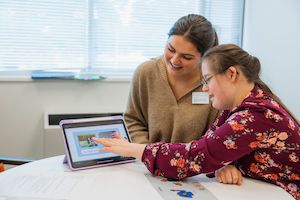
As a graduate clinician in Widener's SLP Clinic and/or Chester Community Clinic, you will work closely and collaboratively with your peers across the health professions to develop comprehensive, holistic, interdisciplinary plans of care. When you enter the profession, you'll be ready to hit the ground running.
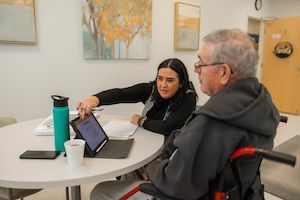
Here, you'll collaborate in classroom and clinical experiences with experts in neighboring fields. This interprofessional focus will help you understand the team approach to holistic care.

With support from faculty mentors and clinical practitioners, you'll develop into a citizen of character who demonstrates professional and civic leadership. Starting in your first semester, you'll study professional ethics and practice ethical competencies. You'll also have an opportunity to participate in the speech-language pathology leadership board in our pro bono Chester Community Clinic.
In our speech-language pathology program, you'll focus on building clinical competence, civic engagement, and respect for diversity. All of these elements come together when you go hands-on in the field. Whether you’re working in our pro bono clinic or completing community projects, you'll build a powerful skill set that will serve you in your first job and beyond.
I am passionate about helping Widener students achieve their academic and professional goals. I enjoy balancing my extensive clinical experience with research and evidence-based practice to help students build practical and professional skills.
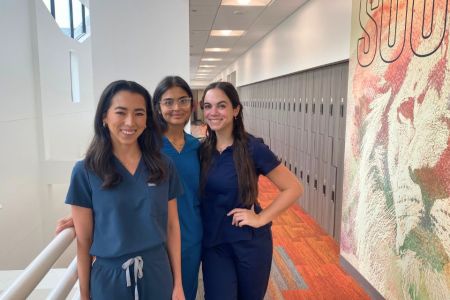
The clinical anatomy lab provides graduate health science students with hands-on access to study anatomy, master techniques and build confidence ahead of practice. In this first-person narrative, physician assistant students Sarah Connors, Jordan Li and Vrunda Patel share how the experience not only teaches them about the body, it deepens their understanding of the human experience.
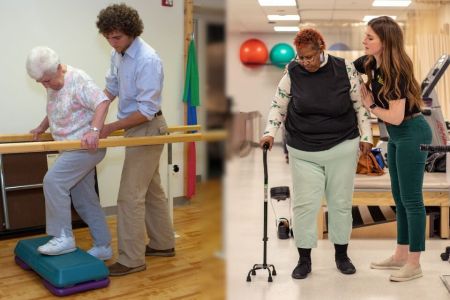
When the Chester Community Clinic first opened in September 2009 its purpose was simple: serve the community and give students an exceptional learning experience. Years of dedication to quality care and strategic transformation have established the clinic as an anchor in the community and a celebrated national model for student-led pro bono care and education.
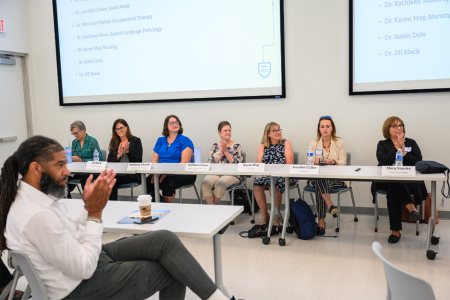
A partnership between Widener and the Coalition of Culturally Competent Providers invites new conversations about community care and creates opportunities for health and human services students.
Our admissions and financial aid teams are here to support you every step of the way. Have a question? Ask away!
The application deadline is April 1. All students must apply through the Communication Sciences and Disorders Centralized Application System (CSDCAS) website. Upon completion and verification of the application, students may be asked to visit campus for an interview.
For additional application process information, please visit CSDCAS.
Widener University's master of science in speech-language pathology maintains the following articulation agreements:
Immaculata University: 3+2 and 4+2
Widener University serves as a "second home" for students from around the world. We are located just outside of Philadelphia and close to New York City and Washington, D.C.—offering many unique professional and personal opportunities to explore.
Want to know what it's like to be an international student on campus or need assistance navigating English proficiency requirements? We're here to help, and our international admissions director will support you through the application process. This support doesn't end with admissions—our International Student Support team will serve as a valuable resource throughout your Widener journey—meeting Visa/immigration requirements, getting acclimated to campus, and much more.
Learn more about applying as an international student
Learn more about life at Widener as an international student
Because Widener is a private institution, we're able to offer financial assistance that brings our education within reach for individuals who might otherwise not be able to afford it.
You might be surprised how much we are able to offer.
Getting started is easy. Simply apply to Widener and submit your FAFSA to be automatically considered for scholarships and grants. "FAFSA" stands for the Free Application for Federal Student Aid and helps identify whether you are eligible for aid awarded by Widener, the government, and other sources. Our school code is 003313.
In order to receive a financial aid offer, students must meet certain eligibility requirements. Here are the general eligibility requirements for most financial aid programs:
Learn more about applying for financial aid as a graduate student
Simply apply to Widener and complete the financial aid process to be automatically considered for scholarships and grants. Because Widener is a private institution, we are able to offer financial assistance that brings our education within reach for individuals who might otherwise not be able to afford it. You might be surprised at how much we are able to offer in assistance.
In order to receive your part of the financial aid pie, all you have to do is submit your FAFSA. "FAFSA" stands for the Free Application for Federal Student Aid and helps identify whether you are eligible for aid awarded by Widener, the government, and other sources.
Widener offers a limited number of graduate assistantships to enrolled students. GAs receive tuition assistance for their work. Once you're a student, contact your program director for more information.
Widener University also partners with many local organizations and corporations to offer discounted tuition and other incentives to their employees. Don't see your company on the list? Ask them to become a partner. In addition, employers often offer educational reimbursement benefits. We encourage you to explore these opportunities and will be glad to provide any necessary documentation.
A limited number of university-based scholarships are made available to enrolled graduate students made possible directly from our academic department or thanks to the generosity of university donors. No extra steps are needed to be taken prior to admission. Once enrolled, contact your program director to learn more.
If you graduated with a degree from Widener, you may qualify for a 20% tuition discount. The first step to see what you qualify for is to submit your application. Widener offers students many paths to savings, and while we don't offer "double discounts", we'll make sure you'll get the biggest financial benefit you're eligible for. Only students who have completed an associate's, bachelor's, master's, or doctoral degree are eligible. Students who have pursued a 4+1, 4+2, or 3+3 pathway, graduate assistantship, Widener-funded scholarship, or other tuition discount may not be eligible if the financial discount granted surpasses 20%.
Tuition rates are subject to change. Official costs for your first year will be determined at time of enrollment.
To visit Widener is, often, to fall in love with the place. To fit your timeline and schedule, we offer a variety of ways to get to know us.
We offer a variety of virtual events to get to know Widener and meet with faculty and admissions staff.
Have a question about Widener? Drop us a line and an admissions counselor will be in touch. We're always happy to help!
Once you’re ready to apply, you will submit all applications and supplemental materials through the Communication Sciences and Disorders Centralized Application Service.
Academic Center North
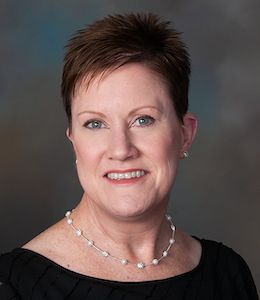
ACN 123
